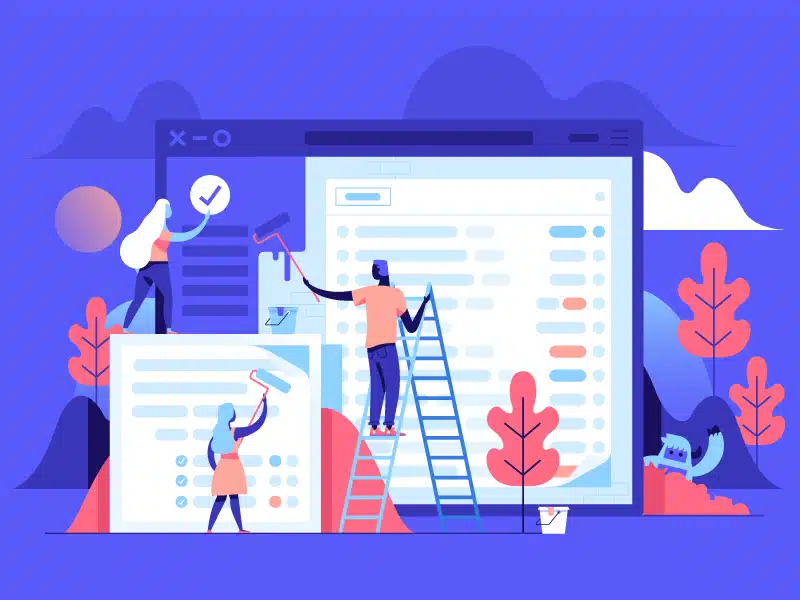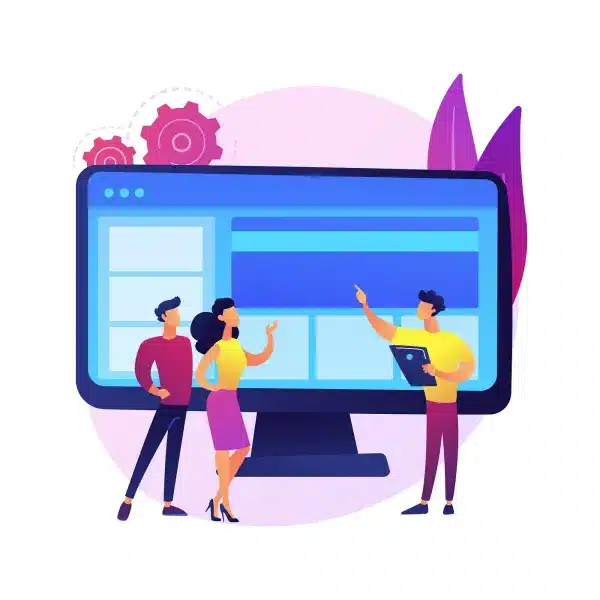Outsourcing web design comes in various forms. But is it the right choice for everyone? How do you find an outsource web design company that aligns with your requirements? Here’s a comprehensive guide for you from TECHVIFY.
I. What Is Web Design Outsourcing?
Web design outsourcing involves partnering with external professionals or agencies to manage the design facets of your website. This can encompass everything from the site’s aesthetics to enhancing the user experience (UX).
Outsourcing companies like TECHVIFY Software, especially those specializing in outsourcing website design, typically boast a team of adept designers, developers, and project managers. Together, they work to produce content that mirrors your distinct brand and business needs.
II. Benefits of Outsourcing Web Design
How about outsourcing web design work? Here are compelling reasons to go ahead:
| Cost Benefits | Outsourcing web design is often more economical than maintaining an in-house team. Engaging a web design expert from regions like Eastern Europe or Asia offers significant savings. Typically, businesses spend around $90,000 annually on in-house designers. However, designers from offshore locations can provide similar quality for a fraction of that price. |
| Access to Worldwide Experts | You tap into a global talent pool by opting for web design outsourcing. You’re no longer confined to just the local experts or agencies nearby. With today’s advanced communication and data transfer tools, you can effortlessly collaborate with professionals from any corner of the world. |
| Efficient Use of Time | Onboarding an in-house designer often entails navigating through extensive company procedures. On the other hand, when you outsource website design, the designer can easily fit into specific project stages as required. They can promptly tackle design challenges without being a permanent team member. |
| New Insights | Incorporating an external designer can breathe new life into your project. They can introduce innovative solutions and fresh perspectives that an in-house team might miss. Leading IT service providers often house experts with extensive experience and unique insights from diverse projects. |
| Superior Web Quality | Delegating your web design to external professionals can enhance the end product’s quality. For instance, if you collaborate with a third-party UX design expert, they might have a set daily rate. Though this could appear steeper than your in-house designer’s fee, the specialist’s expertise can result in a more refined and superior website. |
III. How Does Outsourcing Web Design Work?

More than just a decision, knowing how to outsource web design work involves clarity about your project and finding the right team to realize your vision.
Here are some steps to guide you through outsourcing your web design:
1. Clarify Your Project’s Scope
A website’s design is a blend of creativity and clarity. Understanding the project’s objectives, target users, design preferences, and functionalities is crucial. Start by crafting a detailed creative brief. This document should highlight the project’s aims, objectives, timeline, and budget.
To streamline the scope:
- What’s the main goal of the website?
- Who are the intended users, and what are their requirements?
- Which features and functions are necessary for the site?
- Are there any specific design or branding guidelines to follow?
- What’s the project’s timeline and budget?
Answering these will set a clear path and expectations for the project, ensuring timely and budget-friendly results.
2. Dive into Contract Details
Outsourcing is a formal business engagement, and a solid contract safeguards both parties’ interests. Since every project is unique, contracts vary.
It’s vital to understand different contract types:
- Time and Materials Contract: You’re billed based on hours spent and materials used. Ideal for intricate projects needing collaboration.
- Fixed-Price Contract: Set a price for the entire project upfront. It is best when you have a clear project vision.
- Retainer Contract: Suitable for continuous work, where you pay regularly for ongoing services.
- Pain Share/Gain Share Contract: The designer shares a percentage of project profits or losses. Suitable for those with budget constraints.
- Task-Based Contract: Pay for each completed task, ensuring satisfaction with each step.
3. Decide on Outsourcing Type
Your web design can be outsourced to a freelancer or a specialized company, depending on your budget and needs.
- Freelancer: The online world is filled with diverse freelance designers. They’re often cost-effective, especially for those on a tight budget. A proficient freelancer communicates well, is open to feedback, and meets deadlines.
- Companies: They have teams of creative experts offering various design services. While they might be pricier than freelancers, companies bring collective expertise. They’re known for excellent communication, customization, and prompt delivery. Opting for a company ensures a solution tailored to your specific needs.
More Outsourcing Insights at TECHVIFY:
IV. How Much Does It Cost to Outsource Web Design?
Several crucial elements come into play when determining the cost of Outsource Web design. These factors are consistent regardless of the nature of the app or website you’re developing. Let’s delve into these determinants:
1. Planning the Features
When entrepreneurs approach a design company, they either:
- Have a clear concept of the app with a defined set of features.
- Possess a general idea that needs further refinement.
Designers must chart the user journey and decide on the features in scenarios where the idea is not fully fleshed out. This involves detailing the functionality of each element, such as how the app will handle payments—the more time spent on this stage, the higher the design cost.
2. Quantity of Features
An increase in the number of features translates to more screens for design. For instance, an app with multiple user roles and functionalities will naturally cost more to design due to the sheer volume of features.

3. Complexity of Features
Some features are inherently more intricate than others, affecting the design cost. For instance, an educational app might use a simple congratulatory screen post-lesson or employ a more elaborate gamification system with progress trackers and avatars. The latter, being more complex, would be pricier to design.
4. Design Element Intricacy
The visual appeal and style of the Outsource Web design can influence its cost. A design with intricate animations, interactive components, and custom-made icons will be more expensive than a minimalist one.
5. Design Team’s Proficiency
The cost of design services can vary based on the team’s experience and the company’s nature. Factors include:
- The team’s years of experience in Outsource Web design.
- The company type and the spirit of the partnership (freelancer, in-house team, or outsourcing company).
In essence, the cost of an Outsource Web project is shaped by the above factors. To get an accurate estimate, one would need to detail the user journey, calculate the design time for each step, and then multiply it by the team’s hourly rate.
V. How to Choose a Web Design Company?
Choosing the ideal web design company for your business can be daunting, especially with the many options available. Here are some pivotal factors to consider:
1. Budget Constraints
Determine a budget that aligns with your business goals. While it’s essential to get value for money, avoid compromising on quality for cost. Understand what’s included in the price and inquire about additional costs for specific features or changes.
2. Examine Their Portfolio
A company’s past work can provide insights into its design style and expertise. Review their portfolio and case studies to gauge their capability and see if their designs resonate with your vision.
3. Client Retention Rate
A high client retention rate often indicates consistent quality and adaptability. If a company has maintained long-term relationships with clients, it suggests they’ve successfully navigated challenges and delivered results.

4. Communication Skills
Effective communication is crucial. Ensure the company is responsive, provides timely updates, and understands your requirements. The quality of interaction can significantly impact the project’s outcome.
5. Customer Support Mechanism
Evaluate the company’s support system. Whether a ticket-based system or personalized support, it should align with your preferences, ensuring smooth communication during website issues.
6. Site Relocation Services
If you anticipate changing hosting providers, check if the company offers site relocation services. This can save you time and reduce potential problems down the line.
7. Clear Deadlines
Establish clear deadlines for project milestones. This ensures timely delivery and aids in planning other business activities around the website’s launch.
8. Creative Collaboration
If you prefer active involvement in the design process, choose a company that values client input and can seamlessly integrate your ideas.
By considering these factors and finding the right questions, you can make better choices and select a web design company that aligns with your business needs and vision.
Conclusion
Now that you know how to select a web design company, allow us to present our team. At TECHVIFY, our expertise in web design is evident through our globally recognized team. Our dedication to our clients has garnered accolades and driven increased traffic, clientele, and revenue for them. We prioritize delivering web design solutions tailored to each client’s needs and financial plan.
Are you interested in a bespoke website that delivers for your business?
Reach out for a complimentary estimate or connect with us to kickstart your personalized web design journey!
TECHVIFY – Global AI & Software Solution Company
From Startups to Industry Leaders: TECHVIFY prioritizes results, not just deliverables. Accelerate your time to market and see ROI early with high-performing teams, AI (including GenAI) Software Solutions, and ODC (Offshore Development Center) services.
- Email: [email protected]
- Phone: (+84)24.77762.666





